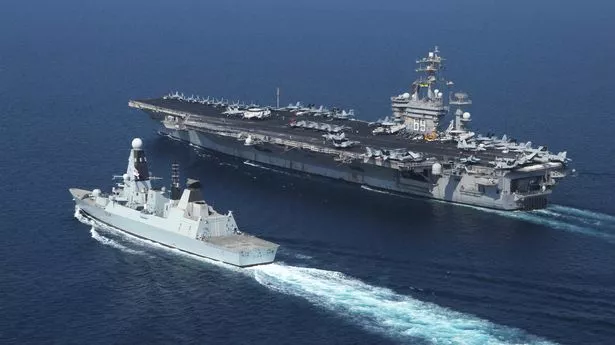- The Yemen conflict has evolved into one of the most devastating humanitarian crises in recent history. While the war began as an internal power struggle, the involvement of external powers, particularly the United States, has had a significant impact on its escalation. In this article, we will explore the nature of the American involvement in Yemen, the political and humanitarian implications, and the changing dynamics under President Joe Biden.
Table of Contents
ToggleUnderstanding the Yemen Conflict
Yemen has been embroiled in civil war since 2014, when the Houthi movement, a Shiite rebel group from northern Yemen, seized the capital Sanaa. The government of President Abd-Rabbu Mansour Hadi, backed by a Saudi-led coalition, responded with military force, leading to a prolonged and bloody war. This conflict quickly escalated due to the involvement of regional powers, each pursuing their own interests.
The U.S. Role in the Yemen Conflict
The United States’ involvement in the Yemen war has largely been aligned with the Saudi-led coalition, which includes Saudi Arabia and the United Arab Emirates (UAE). The U.S. has played a key supporting role through intelligence sharing, weapons sales, and logistical support. In fact, the U.S. has sold billions of dollars worth of arms to Saudi Arabia, some of which have been used in airstrikes that critics argue have disproportionately affected civilians.

Strategic Interests Behind U.S. Involvement
The U.S.’s alignment with the Saudi-led coalition is rooted in broader geopolitical considerations. Saudi Arabia and the UAE are crucial allies in the Middle East, and their role in countering Iran’s influence is significant for American interests in the region. The Houthis, who control much of northern Yemen, are seen as backed by Iran, creating a proxy conflict between the U.S. and Iran.
While the U.S. has largely focused on counterterrorism operations in Yemen, including drone strikes against Al-Qaeda and ISIS affiliates, its support for Saudi Arabia has drawn significant criticism from both human rights organizations and global powers. U.S.-backed airstrikes have been linked to civilian casualties, raising serious ethical concerns about American involvement.
Humanitarian Crisis in Yemen
The conflict has led to a humanitarian disaster of unprecedented scale. According to the United Nations, more than 250,000 people have died as a direct or indirect result of the war, and millions are at risk of starvation. The U.S. has been accused of enabling the Saudi-led coalition’s air campaign, which has caused widespread destruction of civilian infrastructure, including hospitals, schools, and markets.
Despite this, the U.S. continues to face pressure for its support of the coalition, especially given the allegations of war crimes committed by both sides of the conflict. The situation is exacerbated by the ongoing blockade on Yemen, which has made it nearly impossible for humanitarian aid to reach those in need.
Biden’s Shift in U.S. Policy Toward Yemen
Under President Joe Biden, there has been a notable shift in U.S. policy regarding Yemen. In February 2021, Biden announced the end of U.S. support for offensive operations by the Saudi-led coalition in Yemen. This move was seen as an attempt to distance the U.S. from the humanitarian crisis, signaling a change in how the U.S. would engage in Middle East conflicts.
Biden’s administration also appointed a special envoy for Yemen to facilitate peace talks and push for a political resolution to the conflict. However, arms sales to Saudi Arabia continue, with the U.S. justifying them as necessary to counter Iranian influence in the region.

Trump’s Recent Military Action in Yemen (March 2025)
In a dramatic escalation of the Yemen conflict, President Donald Trump ordered military strikes on March 15, 2025, targeting Houthi rebel forces in Yemen. The airstrikes were in response to the Houthis’ recent attacks on international shipping routes, including vessels in the Red Sea. These attacks were seen as an escalating threat to global shipping lanes and U.S. interests in the region.
The strikes aimed at Houthi military assets, including missile systems, radars, and air defenses, were described as an effort to restore security in vital shipping corridors. While the action marked a significant increase in U.S. military involvement, the U.S. government emphasized that it would use “overwhelming lethal force” to counter any future threats.
This military intervention is part of Trump’s broader policy to counter Iranian influence in the region, as the Houthis are believed to receive support from Iran. The operation is expected to add more tension to the already fragile dynamics in the Middle East, especially with Iran’s regional influence and its involvement in proxy conflicts.


Greetings,
I hope this message finds you well. We are seeking strategic business partners and individuals interested in collaborating on exclusive investment opportunities. We represent a network of high-net-worth individuals (HNWIs) from Ukraine, Russia, Africa and the Middle East
Given the nature of the funds, further details will be shared upon request including amount involved. If it interests you to collaborate with us at no risk, please feel free to reach out for a confidential discussion.
Looking forward to your response.
Best regards,
Alex Amin
Email:alexanderamin@infinitycapitalinc.org
Can you provide more details